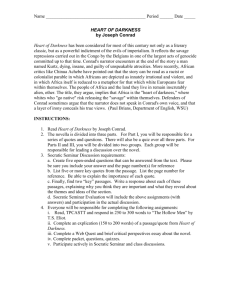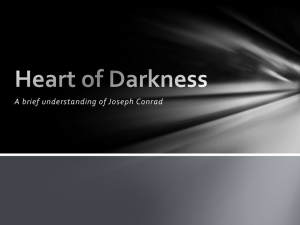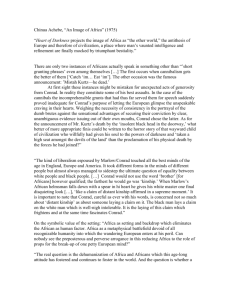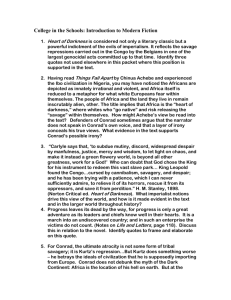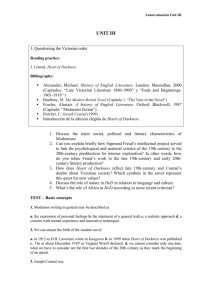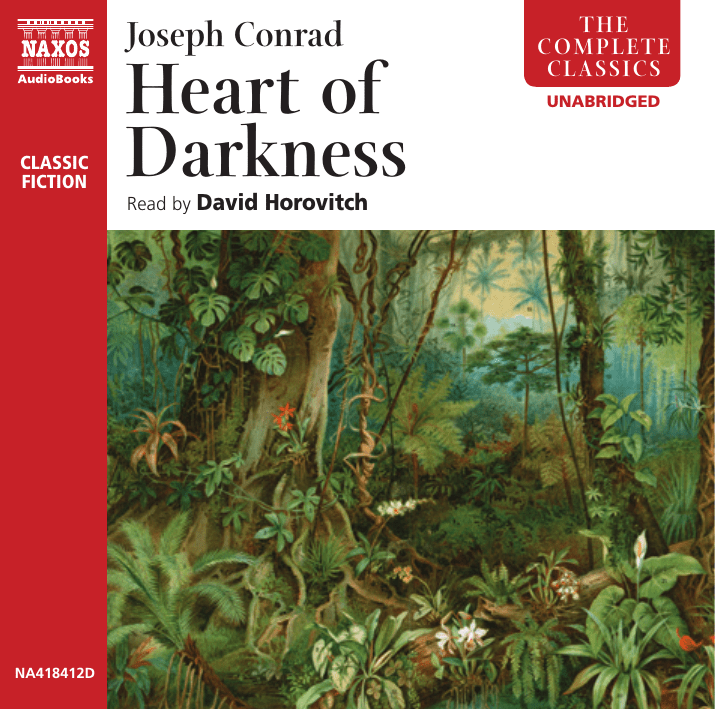
Joseph Conrad
CLASSIC
FICTION
NA418412D
Heart of
Darkness
Read by
David Horovitch
TH E
COM PLET E
CLASSICS
UNABRIDGED
Part One
The Nellie, a cruising yawl, swung to her anchor…
2 And at last, in its curved and imperceptible fall…
3 The sun set; the dusk fell on the stream…
4 ‘I was thinking of very old times, when the Romans…’
5 He broke off. Flames glided in the river…
6 ‘You understand it was a Continental concern…’
7 ‘I flew around like mad to get ready…’
8 ‘There was yet a visit to the doctor…’
9 ‘One thing more remained to do…’
10 ‘I left in a French steamer…’
11 ‘We gave her her letters…’
12 ‘A slight clinking behind me made me turn…’
13 ‘Black shapes crouched, lay, sat between the trees…’
14 ‘Everything else in the station was in a muddle…’
15 ‘No use telling you much about that…’
16 ‘I did not see the real significance of that wreck...’ 17 ‘He began to speak as soon as he saw me…’
1
2
3:32
2:51
2:48
5:14
4:50
4:00
5:27
3:47
2:39
4:46
4:32
4:42
5:32
4:33
5:09
4:53
2:07
‘I went to work the next day…’
‘They beguiled the time by backbiting and intriguing…’
20 ‘He blew the candle out suddenly…’
21 ‘I would not have gone so far as to fight for Kurtz…’
22 ‘He was becoming confidential now…’
23 ‘I slapped him on the back and shouted…’
18
5:13
19
4:51
Part Two
‘One evening as I was lying flat…’
25 ‘The two below me moved away…’
26 ‘They swore aloud together – out of sheer fright…’ 27 ‘I beg your pardon. I forgot the heartache…’
28 ‘The earth seemed unearthly…’
29 ‘Some fifty miles below the Inner Station…’
30 ‘The simple old sailor, with his talk of chains…’
31 ‘Towards the evening of the second day…’
32 ‘I went forward, and ordered the chain to be hauled in…’
33 ‘For the rest, the only thing to eat…’
4:52
5:02
4:23
5:06
24
3
4:05
3:34
4:14
5:42
5:19
2:59
3:00
4:29
3:36
3:53
‘Two pilgrims were quarrelling in hurried whispers…’
‘You should have seen the pilgrims…’
36 ‘No sooner had we fairly entered it…’
37 ‘A fusillade burst out under my feet…’
38 ‘We two whites stood over him…’
39 There was a pause of profound stillness… 40 ‘“Mostly fossil,” the manager had remarked disparagingly.’
41 ‘He began with the argument that we whites…’
42 ‘Poor fool! If he had only left that shutter…’
43 ‘His aspect reminded me of something I had seen…’
44 ‘The pipe soothed him…’
34
3:30
35
2:10
Part Three
‘I looked at him, lost in astonishment…’
46 ‘On the contrary. It appears their intercourse…’
47 ‘I had taken up my binoculars while we talked…’
48 ‘I am not disclosing any trade secrets…’
49 ‘His voice lost itself in the calm of the evening…’
50 ‘Some of the pilgrims behind the stretcher…’
5:16
4:38
4:03
4:04
5:41
3:54
5:12
3:39
2:55
45
4
3:55
3:59
3:55
4:33
4:10
2:35
‘She walked with measured steps…’
‘At this moment I heard Kurtz’s deep voice…’
53 ‘I had turned to the wilderness really…’
54 ‘When I woke up shortly after midnight…’
55 ‘I came upon him, and, if he had not heard me…’
56 ‘There was nothing either above or below him…’
57 ‘He kept on looking out past me with fiery, longing eyes…’
58 ‘Kurtz discoursed. A voice! A voice! It rang deep…’
59 ‘We broke down – as I had expected…’
60 ‘All the pilgrims rushed out to see. I remained…’
61 ‘No, they did not bury me…’
62 ‘Ultimately a journalist anxious to know something…’
63 ‘I thought his memory was like the other memories…’
64 ‘The dusk was falling. I had to wait…’
65 ‘“You knew him best,” I repeated. And perhaps she did…’
66 ‘“I have been very happy – very fortunate…”’
67 ‘“His end,” said I, with dull anger stirring in me…’
51
3:45
52
3:12
4:55
5:07
4:21
4:27
2:40
3:06
4:11
4:58
4:51
3:07
3:22
4:31
3:37
3:05
4:47
Total time: 4:38:46
5
Joseph Conrad
(1857–1924)
Heart of Darkness
Joseph Conrad was born Józef Teodor
Konrad Korzeniowski to patriotic Polish
parents in Berdichev, in Russian-occupied
Polish Ukraine. His father, a literary
translator, was also politically radical, and
as a result was exiled some 300 miles
north of Moscow. The weather at such a
latitude took as heavy a toll on the family
as did their exile, and Conrad’s parents
both contracted tuberculosis. Although
the family was allowed to move to a less
demanding climate, Conrad’s mother died
in 1865, and his father in 1869. By the
age of 11, Conrad was an orphan who
had seen his parents killed by incurable
disease and also by political repression,
a combination of pitiless nature and
equally inhuman man that finds an echo
throughout all of Conrad’s fiction.
The echo is there because these ideas
became central to Conrad’s vision of the
world, a vision which was polished like
a lens by his early experiences in Poland
up until the age of 16, and then by his
life as a mariner over the two succeeding
decades. He became a seaman in part
because he was trying to avoid Russian
military service (his original plan was to
take Austro-Hungarian citizenship), but
also because he felt a powerful magnetic
desire for the sea, for travel in general
and to Africa in particular. Getting on
the ocean didn’t solve all his problems
immediately – in 1878 he was nearly
killed in what may have been a duel over
a woman, but was more likely (though
not certainly) a suicide attempt following
the loss of substantial sums in a casino.
Either way, he ended up losing his place
within the French merchant fleet, and so
joined the English ship Mavis. Over the
next few years English became his third
language (he was fluent in French as well
as his native Polish), and upon becoming
6
a Master Mariner he was able to become
naturalised – and transformed himself into
Joseph Conrad.
He travelled on some of the finest
vessels of the age (such as the Torrens, a
renowned passenger boat that held the
record for sailing to Australia) and some of
the worst (such as the Palestine, which took
more than a year to sail from Newcastle to
Indonesia before being destroyed by fire),
and most types of vessel in-between. He
also stayed in some very luxurious places.
But Conrad was living the life dangerously
as well as fully, being involved in gunrunning for Spanish rebels at one point;
significantly, he found his world-view
becoming more and more clearly defined
by what he experienced on his travels. He
seemed to see the very worst of mankind’s
attitudes and behaviour, and these formed
the basis for many of his fictions. His trips
to Africa, South America, southern Europe
and elsewhere gave him immediate
contact with exotic, hardly-known places
that he would later bring to menacing and
knowingly inchoate life. But it was not just
a profound sense of place that he gave to
his stories and tales – he filled them with
the darkest elements of human nature,
too. Deprivation, cruelty, failure of honour,
vicious brutality and cynical self-interest
marked the humanity that he observed.
This was most evident in the voyages
that were the inspiration for Heart of
Darkness. In 1890, beginning his first
novel (Almayer’s Folly), he began the long
process of divorcing himself from the sea
and becoming a writer. In the same year
he was given the chance to be a mate on
a steamer operating in the Belgian Congo.
Conrad had longed, for years, to go to
Africa, drawn by the particular mystery it
seemed to exert on the European Victorian
imagination. But what he saw there was
the most brutal, systematic, corrupt and
violent suppression – rapine on a national
scale for the benefit of the Belgian king’s
pockets. Torture, kidnapping, murder,
mutilation and more were all used to
ensure a workforce of slaves to gather
the rubber crop. When Conrad came to
write Heart of Darkness, some eight years
later (it was first published in 1898–99
in serial form in Blackwood’s Edinburgh
Magazine), he had matured significantly
as a writer; as a result he transformed
7
this horrific truth into something that was
somehow even darker – a metaphor for
human civilisation, for the human soul, for
humanity.
That is at least one way of seeing it.
There are many. The story could be a wellcrafted piece of not-quite-fact, a powerful
indictment of Belgian colonialism, a
general work on the nature of Empires,
a broader fable about power and belief,
or an even broader symbolic warning
about the power of darkness in its many
forms to overwhelm the light; perhaps the
story is not looking outwards at all, but
inwards, towards the individual’s essential
self. The reason for this multiplicity of
potential is that the language Conrad
uses is full of implication, uncertainty
and suggestion. He creates rolling tides
of words that imply much more than
they directly state, generating complex
and convincing atmospheres rather than
specific meanings. In his writing his
concern was not specifically for the action
itself, but its effect on the protagonists
and especially the readers: he wanted to
illuminate truths. With Heart of Darkness,
he went further, creating something like
a 20th-century myth that continues to
enthral and inspire people (most notably
in recent times as the Urtext for the film
Apocalypse Now).
Conrad took from his internal life as
well as his external one, of course, but
this was no happier a source. He could
be emotionally unstable and suffered
from depression; he was ill for much of
his life (some of it a result of his time in
the Congo); and he had an essential Polish
sense of the dramatic and romantic, allied
to a profound nihilism. And the fact that
English was not his first language added a
further dimension to his writing. He could
bring his European sensibility to bear on
the subjects he wrote about, and at the
same time use different rhythms, even a
slightly unusual vocabulary. The result was
the unique cadences and rich allusiveness
of his greatest works.
His marriage and two children did
not bring him much joy. Many of his
considerable circle of literary friends
found his marriage to Jessie George
inexplicable – she was 15 years his junior,
a typist from Peckham, and had nothing
in common with Conrad (she might have
8
countered that Conrad’s literary circle
were themselves a pretty inexplicable
bunch: Ford Madox Ford once washed his
greasy Panama hat in her sink then dried
it in the oven above her Sunday roast).
But then, Conrad found working under
adverse circumstances more productive;
joy seems not to have been his destiny.
Notes by Roy McMillan
9
David Horovitch has had a long and distinguished career in
theatre, television and radio. His theatre appearances include
Collaboration and Taking Sides at The Chichester Festival Theatre
and The Duchess, as well as Life Is a Dream at The Donmar. On
television, he is best known for his appearance as Inspector Slack in
five Miss Marple stories with Joan Hickson. His film credits include
Young Victoria. His radio credits include The Barchester Chronicles.
For Naxos AudioBooks, he has read Alice in Wonderland, The Good
Soldier Švejk and The Leopard.
Credits
Produced by Nicolas Soames
Recorded at Liberty Hall Studios, New Barnet
Edited by Malcolm Blackmoor
Cover picture: Tropenwald (Tropical forest), Colour print after H. Eichhorn; courtesy of
AKG Images
ALL RIGHTS RESERVED. UNAUTHORISED PUBLIC PERFORMANCE, BROADCASTING AND
COPYING OF THESE COMPACT DISCS PROHIBITED.
10
Other works on Naxos AudioBooks
Nostromo
(Conrad) ISBN: 9789626348901
read by Nigel Anthony
The Last of the Mohicans
(Cooper) ISBN: 9789626340875
read by William Hope
Robinson Crusoe
(Defoe) ISBN: 9789626340653
read by Nigel Anthony
Billy Budd, Sailor
(Melville) ISBN 9789626343005
read by William Roberts
11
THE
COMPL ET E
CLASSICS
Joseph Conrad
Heart of Darkness
Read by
UNABRIDGED
Produced by
Roy McMillan
p 2010 Naxos
AudioBooks Ltd.
© 2010 Naxos
AudioBooks Ltd.
Made in Germany.
David Horovitch
‘…he seemed to stare…with that wide and immense stare embracing,
condemning, loathing all the universe. I seemed to hear the whispered cry, “The
horror! The horror!”’
On a becalmed yawl in the Thames estuary, Marlow tells a tale of Africa.
His job there is to find the enigmatic Kurtz, but his journey farther and farther
upriver reveals the brutality of the white Imperialists who run the country.
Established as one of the great English novels, and a story of mythic power,
Heart of Darkness is rich in meaning – allusive, enthralling and haunting.
‘And this also,’ said Marlow suddenly, ‘has been one of the dark places of
the earth.’
David Horovitch has had a long and distinguished career in theatre,
television and radio. His film credits include Young Victoria. For Naxos
AudioBooks, he has read Alice in Wonderland, The Good Soldier Švejk
and The Leopard.
CLASSIC
FICTION
UNABRIDGED
CD ISBN:
978-962-634-184-1
View our catalogue online at
www.naxosaudiobooks.com
Total time
4:38:46


